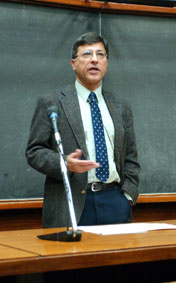Personal tools
News from ICTP 108 - Profile

Pervez Amirali Hoodbhoy, recent winner of the UNESCO Kalinga Prize, is a researcher and scholar with deep convictions that extend beyond science to social and political issues.
Science and Society

Pakistani-born physicist Pervez
Amirali Hoodbhoy, who was awarded UNESCO's prestigious Kalinga
Prize for the popularisation of science in 2003, is one of a rare
breed of scientists, equally at home in both the world of science
and the world of social and political affairs.
Hoodbhoy, professor of physics at Quaid-e-Azam University in Islamabad,
was born in Karachi in 1950. He received his bachelor's, master's
and PhD degrees all from the Massachusetts Institute of Technology,
USA, studying electrical engineering, mathematics, solid state
physics and nuclear physics along the way. Not wanting to be another
statistic in the brain-drain phenomenon, he returned to Pakistan
in the early 1970s and has been a faculty member at Quaid-e-Azam
University ever since. His main research interests are quantum
mechanics, quantum chromodynamics and supersymmetry.
An ICTP Associate from 1986 to 1992, Hoodbhoy has visited Trieste
on many occasions. In November 1997, he lectured at the Abdus
Salam Memorial Meeting, organised one year after the death of
the Centre's founder. Hoodbhoy used the occasion to speak "not
about Salam's unparalleled success but, instead, his most spectacular
failure: Salam's unfulfilled quest to bring science to Pakistan
and other Muslim countries."
"It's a sad paradox," Hoodbhoy recalled then,"
that such a profoundly religious individual as Salam, who was
member of the Muslim Ahmadiya minority, ultimately became a non-Muslim
in a state where non-Muslims are by law second-class citizens."
Even worse, "Salam was the target of bitter attacks and vilification.
Magazines concocted wild conspiracies of nuclear espionage, claiming
that Salam had sold nuclear secrets to India. Fundamentalist student
groups made it virtually impossible for Salam to visit any university
campus. I am ashamed to say that Salam could never set foot in
my university in Islamabad, whose physics department had been
inspired in considerable part by him, and which was the only department
in the country where his lectures could be understood."
The result, Hoodbhoy bitterly comments today, is that "Salam's
name remains unknown to school children in Pakistan."
Apart from his scientific work, Hoodbhoy chairs Mashal Books,
a non-profit organisation that publishes monographs in Urdu on
women's rights, education and the environment. He has written
and spoken extensively on topics ranging from science in Islam
to education in Pakistan. More recently, Hoodbhoy has produced
three documentary series in Urdu, broadcast weekly by Pakistani
television, focusing on education, the power of scientific thinking
and the mysteries in the universe.
Hoodbhoy is deeply critical of Pakistan's educational system.
"It is based upon rote learning," he notes, "and
it actively seeks to destroy the inquisitiveness of early childhood
by rewarding obedience and punishing originality. Fortunately
it is not 100 percent efficient. Thousands of viewers of the Urdu
science television serials that I produced wrote letters seeking
answers to questions ranging from black holes and supernovae to
the ozone hole and human cloning."
"Science in Islam," continues Hoodbhoy, "has been
stuck solidly in the mud for seven centuries, and is likely to
remain there until Muslim societies open themselves to the realisation
that with science comes the scientific method which, at its core,
requires free thought and open enquiry. Without such a change
in philosophical attitudes, no amount of resources poured into
scientific development is likely to do much good."
Many of Hoodbhoy's articles and essays have been devoted to the
problem of nuclear proliferation set against the backdrop of Pakistan-India
border tensions. Nuclear disarmament remains a passion for him,
and he is a member of the Pugwash Council.
During the past few months, relationships between the two countries
have dramatically improved. Hoodbhoy hopes that "the recent
thaw in Pakistan-India relations could lead to academic exchanges
between the two countries. Pakistan could gain enormously from
employing Indian professors and researchers on short-term contracts,
as well as sending its students to Indian universities for graduate
work in the sciences and arts. Indian faculty members, on the
other hand, could enjoy higher salaries than at home. It would
be a win-win situation."